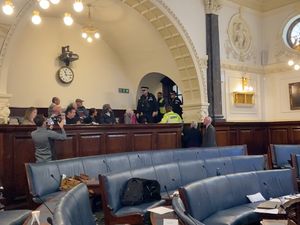Europe arrest row would be unwarranted if only there had been a debate
We need to talk about Europe.
I say that knowing full well that for people who follow politics at the moment it seems as though we talk about little else.
But the farcical scenes in the Commons over the European Arrest Warrant show just how toxic it is proving to be to the Tories.

MPs turned up to vote thinking they were going to get a say on the European Arrest Warrant itself.
Instead the motion put before them was for just 11 of 35 measures that the coalition government wanted to opt into and the warrant was not among them.
The Conservatives would not have wanted to face another rebellion by Eurosceptic backbenchers. But after all these years it should have been abundantly clear to the whips that anything with the word 'Europe' in it is not going to go down well with the likes of Stone's Sir Bill Cash or Aldridge-Brownhills MP Sir Richard Shepherd.
The latter, retiring at the election, made his feelings abundantly clear: "At the heart of this is a misconception about what this House represents... my over long time in this House of Commons has led me to understand the growth of executive arrogance is unsupportable."
Even reading the words one can hear the weariness in his voice. Sir Richard has been an MP since 1979. He's been rebelling on Europe since Maastricht.
Labour's shadow Europe minister is Wolverhampton South East MP Pat McFadden. He said the Tories have a 'psychosis' about the union and pointed out that there was actually more than enough support from the majority of the Tories, Liberal Democrats and Labour to vote the warrant through.
Now Labour has decided to debate and vote on it as part of an Opposition Day on the eve of the Rochester by-election.
The whole thing is a mess. And this is before we have even got to the crucial argument about the warrant itself.
As far as Mr McFadden and Labour are concerned, as well as the Tories in favour of it, is a means by which this country has managed to deport 1,000 foreign criminals in a single year and has resulted in the successful return of people wanted by our own authorities – one of those being Hussain Osman, who was part of the botched attempt to bomb London on July 21 2005. It also brought back Jeremy Forrest, a maths teacher who fled to France with a pupil he'd been having an affair with.
The arguments against include concerns over the ability of other EU member states to demand the extradition of British citizens without sufficient evidence. Sir Richard isn't too keen on having to send people to face the criminal justice system in Italy, highlighting how following the murder of British student Meredith Kercher two suspects were found guilty, then not guilty and then guilty again – the last decision coming after one of them, Amanda Knox, had already returned to America.
Parliament is normally a pretty good forum for airing all these views. There are various legal experts, civil liberties groups and others now turning it into a political football. Maybe we should have been worried about it, maybe not. But if they won't even debate it, the Government can't blame people for drawing their own conclusions.





